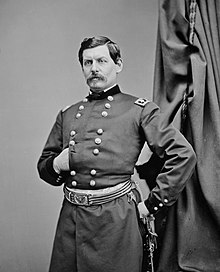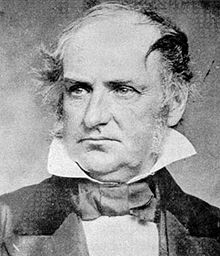
Brigadier General Charles P. Stone and his daughter Hettie
I have had numerous discussions with acquaintances of mine who believe the U.S. government is perfect and sinless. Several conspiracy theories we discuss are always claimed by them to not be true because it would make the central government appear less than honest. One conspiracy that they can't debunk is not a theory, but a known fact.
Charles Pomeroy Stone was born in Massachusetts in 1824. One would come to believe that Stone would be an abolitionist being from the state known to be the hotbed of abolitionism, but that wasn't true. Stone was in fact a soldier first. This country was founded on the principle that professional soldiers shouldn't be tied to a certain party, but loyal to the commander in chief and the constitution. That would best describe Charles Stone. He graduated high in the West Point Class of 1845 and served with distinction in the Mexican War.
When the secession crisis began, Stone was in Washington, and Lieutenant General Winfield Scott chose Stone to organize the defenses of Washington and hold the capital until reinforcements could arrive. Stone was commissioned colonel and called "the first man mustered into service for the defense of the capital..." He was also in charge of security during Lincoln's inauguration. During the Battle of Manassas, Stone would serve in Patterson's command in the Shenandoah Valley. When George McClellan became commander of the Army of the Potomac, he quickly selected Charles Stone as one of his subordinates. Stone was promoted to brigadier general and sent to guard the upper crossings of the Potomac River. Charles Stone now commanded a division.
Per McClellan's orders, Stone had his men returning runaway slaves to their rightful owners. The reason for this is twofold. First, Lincoln wanted the border states (of which Maryland happened to be) to remain in the Union, therefore, he wanted to keep them happy. Secondly, a Federal law called the Fugitive Slave Act was still in effect. (Remember what I stated earlier about soldiers upholding the law?)
A Massachusetts soldier in Stone's command wrote a letter to abolitionist governor John Andrews of his despicable job as a soldier was chasing down runaway slaves. Andrews became upset and wrote Massachusetts Senator Charles Sumner (the same Sumner who'd almost been beat to death by Preston Brooks of South Carolina). Sumner made some very insulting remarks about Stone. Stone complained that governors have no right interfering with army operations and he wrote Sumner a very insulting letter saying it was difficult enough facing an enemy in his front while being attacked by a coward in his rear. Thus, the Radical Republicans were just itching for an excuse to get Charles Stone.
The beginning of Charles Stone's downfall happened on October 17, 1861 when he received a report that the Confederates were evacuating the Virginia shore near Leesburg, Virginia. McClellan saw this as a chance to relieve some pressure upon him for an advance and decided to act. He sent McCall's Pennsylvania Reserves to cross about halfway between Washington and Leesburg and advance on Dranesville, Virginia. Stone was then ordered to demonstrate on his front near Leesburg at a place called Ball's Bluff. To make a long story short, on October 20, McClellan called off the operation, notified McCall to fall back, but didn't mention any of this to Stone. Stone began to ferry men across the river into Virginia. He still believed McCall was advancing on Dranesville to his left.


George McClellan and Edward Baker
At that point, Stone still on the Maryland side of the river, had Edward Baker (one of his subordinates) commanding the field atop Ball's Bluff. Colonel Edward Baker was a senator from Oregon and close friend of Abraham Lincoln. Lincoln had actually named one of his son's after Baker. Although Baker had seen service during the Mexican War, he made serious mistakes at Ball's Bluff. Stone told Baker if the position was found untenable, he was to fall back to the Maryland shore. He ignored the directive and immediately crossed his entire command to the Virginia shore. Most professional soldiers stated that no military man would have chosen to fight on Ball's Bluff with his back to a river a hundred feet below a bluff with a single cow path leading to the water below. Baker chose to do so.
Confederate Brigadier General Nathan G. Evans continued to encircle and apply pressure to the Federal line until it broke. The result was a disaster. There weren't enough boats to ferry all the troops back across. The men tumbled down the bluff as best they could, many jumped into the river and drowned. The entire operation was a disaster costing the Federal army about 1,000 casualties, the Confederates losing about 155 men. The man who was truly at fault was Edward Baker, but to make matters worse, he lay dead on the field with a bullet in the chest and another in the head. Lincoln was so distraught that tears coursed down his cheeks on receiving the news and he stumbled as he stepped into the street.
What does any of this have to do with a conspiracy? This episode gave Governor Andrews and Charles Sumner the ammunition they needed to take Charles Stone out of the army. McClellan immediately sent Stone orders not to reveal any orders that he'd been issued during the investigation. The Committee on the Conduct of the War was formed and the Radical Republicans set out to get their man. A fellow member of the Senate had been killed in battle and someone had to pay the price. The Committee wanted McClellan, but settled on Stone to send McClellan a message.
Witnesses were brought in to testify against Stone, some of which weren't even at Ball's Bluff. One witness testified that Stone had been swapping secret papers with the Confederates (he had actually been swapping mail going to and from Federal prisoners captured at the battle which was perfectly legal). He was charged with treason, they cared not that he had saved Washington at the beginning of the war and protected Lincoln during his inauguration. They were out for blood.
Stone was imprisoned for six months on nothing more than hearsay. McClellan must be given some blame in the affair. He found nothing wrong with Stone's action at Ball's Bluff, but he refused to stand up for him and allow the nation to see how he had been partly responsible for the disaster. Many of the military men criticized Charles Sumner over the "trumped up charges." They referred to the investigation and sentence as ridiculous. General Winfield Scott became so upset at the charges that he stated, "Why, if he is a traitor, I am a traitor, and we are all traitors!"
